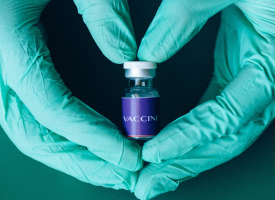Transcript - AMA President Dr Omar Khorshid on 2SM
Transcript: AMA President, Dr Omar Khorshid
Outlet: 2SM Mornings, Friday, 12 November 2021
HOST: John Laws
JOHN LAWS: I've got to say that I'm quite astonished at the amount of misinformation people are so readily able to, to spread - they give themselves a platform and off they go. Absolute rubbish is being spoken by a whole lot of people. There have been dozens of anti-vax people call and email this week - dozens - some of whom claimed to be nurses, some of whom are obviously totally mad. The only right thing that we can hear from somebody who is actually an expert, who is qualified to give us correct information, and that's the person we want to go to, because they're the only people who are able to give us the information that is 100 per cent correct. One of those people is the President of the Australian Medical Association, Dr Omar Khorshid, and he joins me on the line. Doctor, good morning, and welcome to the program.
OMAR KHORSHID: Morning, John.
JOHN LAWS: Is the vaccine safe?
OMAR KHORSHID: All the vaccines we have available in Australia, no matter what they are for, are safe. And they're safe because they’ve been studied by the scientists, they've been, the data has been looked at very sceptically by a panel of experts in Australia. And the government have decided that not only are the vaccines safe, but they're actually worth spending taxpayers’ money on too.
So every single vaccine we've got available to us is absolutely safe. But that doesn't mean they don't have a few side effects. There's no doubt those do exist, and that's part of what I think some people struggle to understand.
JOHN LAWS: Okay, what kind of side effect can be experienced?
OMAR KHORSHID: So, so all vaccines, including these coronavirus vaccines, create an immune response in the body - that's what they're designed to do, otherwise they won't work. Now when you create an immune response, you get substances circulating in your body that can give you some symptoms - they can give you a headache, a fever, they can give you a sore arm, things like that. They're pretty common side effects from vaccinations, and to be honest, they're a good sign, because it means the vaccine's doing its job.
Now, where you get more worried is if these are conditions get a bit out of hand. And there are very, very rare circumstances where the immune response causes a negative effect. And an example of that would be some of the extremely rare side effects that we see with these coronavirus vaccinations, including inflammation of the heart muscle, or the lining of the heart in the case of-
JOHN LAWS: [Interrupts] Is that, is that considered very dangerous? That-
OMAR KHORSHID: Look it's, it's certainly a serious condition, but it hasn't resulted in a single death in Australia. And most people go to hospital for a little while, they get diagnosed, and they get sent home, and they fully recover. The TTS syndrome associated with the AstraZeneca vaccine, a little more serious, but again, the vast majority of people who've had it have fully recovered. But we have, tragically, seen a few people die from the coronavirus vaccines - that nine in Australia out of 37 million doses. And when you compare, that-
JOHN LAWS: Okay. Give me that number again - that's very important.
OMAR KHORSHID: Yes. So it's nine, nine deaths - eight of which were from TTS - out of 37 million doses.
JOHN LAWS: Okay. It, it looks to me like the odds are pretty much in favour of the vaccine?
OMAR KHORSHID: Hugely so. In Australia, we've had 1800 people die from COVID, despite only having 185,000 cases. That's a death rate from COVID of 1 per cent. And of course, if you're over the age of 75, it's more than 10 per cent chance of dying if you get COVID. You get that vaccine, your chance of getting seriously ill through the vaccine is almost zero. And it gives you incredible protection, to the point where you're highly unlikely to end up in hospital, let alone on an ICU ventilator.
JOHN LAWS: So it would appear to me that there's no argument? There shouldn't be an argument anyway.
OMAR KHORSHID: There is absolutely no scientific argument for not having this vaccine. It is as safe as a vaccine could possibly be. And that's- in fact, we've been surprised at just how effective they are in the real world, out in the community.
Sydney is a great example of when you get a population significantly vaccinated, the impact of this terrible virus is vastly, vastly reduced. And we're, we're looking forward to that continuing to be the case as Australia opens up, but we can only get there if we keep our population immune from COVID. That means getting your first two doses of the vaccine if you haven't already. And for those are more than six months down the track, they're now also recommending a booster dose, just to make sure we don't see what we're seeing in other countries, where the virus is making a comeback as the immunity levels drop in the community.
JOHN LAWS: Okay. But tell me, does it make a comeback in a different form? Is it, is it, is that what's confusing? That it comes back? It's the same thing, but in a different form?
OMAR KHORSHID: Well, we've had a few variants of the virus, but at the moment we've got one type of the virus that's really dominating around the globe. And what's happening is that it hasn't actually changed, it's just that people's immunities have waned, and people are picking up the virus in some countries, even though they were vaccinated so six or seven months ago.
So that's why we're recommending a third dose of the vaccine - doesn't matter which one you had the first time - but a third dose of one the, well, at the moment it's the Pfizer vaccine to be given six months or more after those first two doses. And that just gives you that boost to the immunity. We don't know yet whether that's going to be a permanent boost, and that'll be the last dose you ever need, or whether, in fact, we may need to do this every year or so - that's still to be decided. But at the moment, you’ve got that choice of protecting yourself from COVID, versus putting yourself at risk of this terrible condition, which, you know, just devastates people's lives, including people who think they're pretty young and pretty fit.
JOHN LAWS: Yeah.
OMAR KHORSHID: It'll land you to hospital. And of course, the complications from COVID that lasts for months or years into the future are still to be fully discovered.
JOHN LAWS: Okay. When you say immunity has waned, why has it?
OMAR KHORSHID: So one thing we, we know from the way our immune systems work, is that you get a, an initial very vigorous response, either to an immunisation or to catching a virus, and then you get antibodies in the blood, you get cells that are designed to attack that virus and destroy it. But over time, the levels of those antibodies in your blood starts to disappear.
And so in the case of vaccinations, we sometimes need to prime the immune system again to remind it that this challenge could be coming. That's why we give booster doses of a number of the vaccines that we recommend, including those childhood vaccines - we ask people to have booster doses every five or 10 years for some of the vaccines, just to remind the immune system that you need to be ready to attack this, this virus if the patient is exposed.
JOHN LAWS: Doctor, I've been told by people who claim to be nurses, is that people are flooding hospital emergency departments after having received the vaccine. Is there any truth in those sorts of claims?
OMAR KHORSHID: No. There's no truth at all to those claims. And unfortunately, there is just this huge wave of misinformation out there in the community, which is actually causing significant harm, particularly to vulnerable communities, like our- some of our indigenous communities where vaccination rates are so low, simply because people are afraid. And they're afraid of a treatment that is super, super safe and super, super effective. It's really tragic.
So no, we're not seeing any significant numbers of people presenting to hospital with vaccine related problems. And every case that does come up where there is a concern, is reported to the regulator. And every one of those cases is looked at by a panel of experts, and that's how we know so much.
This is actually- this set of vaccines that we're putting out around the world at the moment are the most studied vaccines in the history of vaccination, because everyone is so worried. Everyone is so worried about either catching COVID, or about the safety of the vaccine. So we're looking at it incredibly carefully, and with, now I think it's something in the order of seven billion doses of coronavirus vaccines have been put out around the world. There's no significant problems with these vaccines. They are safe.
JOHN LAWS: Okay. But sadly, misinformation seems to be rife. And as far as the internet is concerned, I do- I think the internet's a real worry when it comes to circumstances like this. What can be done to stop it spreading? What can you- you can't stop the internet, what do you do?
OMAR KHORSHID: Yeah, one thing to do is to at least make reliable information available to people. And there's no doubt that with this particular pandemic, and with the vaccines that are available to counter it, there is a lot of reliable information on the government websites and the websites of reliable institutions. And that's where we would recommend people go if they want to do their own research. But at the end of the day, the other key advice from me as a doctor, is to go to your GP. If you've got significant concerns, if you think that you may have a medical condition that puts you at risk, or there's a legitimate reason why you're worried about the safety of getting a vaccine, go and have a chat to your doctor. They know what they need to know, they can have the information to help you through it. But the simple message from us is, there's almost no reason not to get one of these vaccines. There's almost no reason that you shouldn't protect yourself against this terrible virus.
JOHN LAWS: These people who don't go to the Government websites, they go to some obscure website that happens to suit their beliefs. You know, it's almost impossible to change their minds; are those people a danger to the community?
OMAR KHORSHID: Unfortunately, anti-vaxxers are a danger to the community. And look, everyone is entitled to their views, and they can choose not to be vaccinated if they wish, but they need to recognise the impact that they're having on others. And that's where I think the danger comes in. As I mentioned before, we've got Indigenous communities who we know are at extreme risk of severe illness and death with COVID, where the vaccination rates are appallingly low because of misinformation that's gotten out there on social media. And it’s bizarre stuff. I mean, some of the stories you hear are completely ridiculous. They make no logical sense to anybody who's got their head screwed on. But unfortunately, in vulnerable communities, this information spreads like wildfire and could result in people unnecessarily dying of COVID. And I'll say to any anti-vaxxer out there, do you want to have the deaths of other people on your head? Because that is what you are doing directly to vulnerable people in our communities.
JOHN LAWS: Wow. They're strong words, but obviously accurate words. I don't know, why do people choose to believe this nonsense? I guess it just suits their argument.
OMAR KHORSHID: Well, I think we do have groups of people in our community who come up with different views. We've seen it in politics, we've seen it in the US with a lot of people believing the election was rigged. People will believe things that fit their systems, belief systems. And that is a reality of society. That is why our governments have, in some cases, mandated vaccinations for large groups of people, which is a bit uncomfortable, because, as a rule, we're not in favour of mandatory vaccination. But at the end of the day, we've got to protect our community from this devastating disease, because if someone gets infected, it's not just their own self that they're harming, but they're filling up hospitals, they're exposing doctors and nurses to the virus. And you might stop your neighbour across the road from being able to access proper health care when they have a heart attack because you didn't get vaccinated, and you're taking up their ICU bed, which could have been prevented if you got yourself vaccinated.
JOHN LAWS: Yeah, very, very good point, and well made. The other thing that I constantly hear, Dr, is that we don't know the long-term effects of the vaccine. Is this- you know, people are saying, oh god, it might be another Thalidomide drama. But do we know, really? Do we have any idea of what the long term effect might be? We- I don't think we can.
OMAR KHORSHID: Well, we know because we know about vaccinations and we know about the body's immune system. These vaccines are based on principles that have been around since vaccines started. And we're looking really, really carefully for problems with these vaccines. As I mentioned before, this is the most scrutinised vaccine rollout in the history of the world, and yet we're finding very little. And we know from previous experience with previous vaccines, and of course, there are many vaccines that never make it to market because they're just not quite good enough. And the last thing that any public health program wants to do is harm people with a vaccination program, it's ridiculous. They are very, very conservative; that's why we haven't rolled out the vaccine to children yet, because they're waiting to be 100 per cent sure that the risk/benefit lines up. So we know, though, that those side effects and problems that we do see with vaccines, usually come out within a period of weeks to a couple of months. Vaccines don't have long, long-term negative effects.
JOHN LAWS: The point is that I've- the numbers I've heard that there have been nine vaccine-related deaths out of 37 million doses, I mean, in Australia. Nine vaccine related deaths out of 37 million doses - who would argue?
OMAR KHORSHID: That's right. I mean, you look at the other side of that equation - how many lives have been saved already by these vaccines? And to get an idea of that, you need to look at places like the US or even around the rest of the world, where you've got hundreds of thousands of people who have died. I think Australians are just not quite, you know, got a real sense of how devastating this virus is, and the fact that we've got now over 80 per cent of our population fully vaccinated, and over 90 per cent in some jurisdictions, that is already saving tens of thousands of Australian lives directly, at a tiny cost in terms of the tragic consequences of those who have suffered these very rare side effects. Now, for a medical treatment, that is amazing results. And that's why we are so confident in recommending any of the approved vaccines for use in Australia.
JOHN LAWS: Okay, you've been very generous with your time, which is valuable, I know. So I appreciate that very much Dr Khorshid. And, if we run into trouble about this again, can- could we call you again?
OMAR KHORSHID: Absolutely, very happy to come back on. It's been a pleasure this morning, John.
|
12 November 2021 CONTACT: 02 6270 5478 0427 209 753 media@ama.com.au
Follow the AMA Media on Twitter: http://twitter.com/ama_media
|



